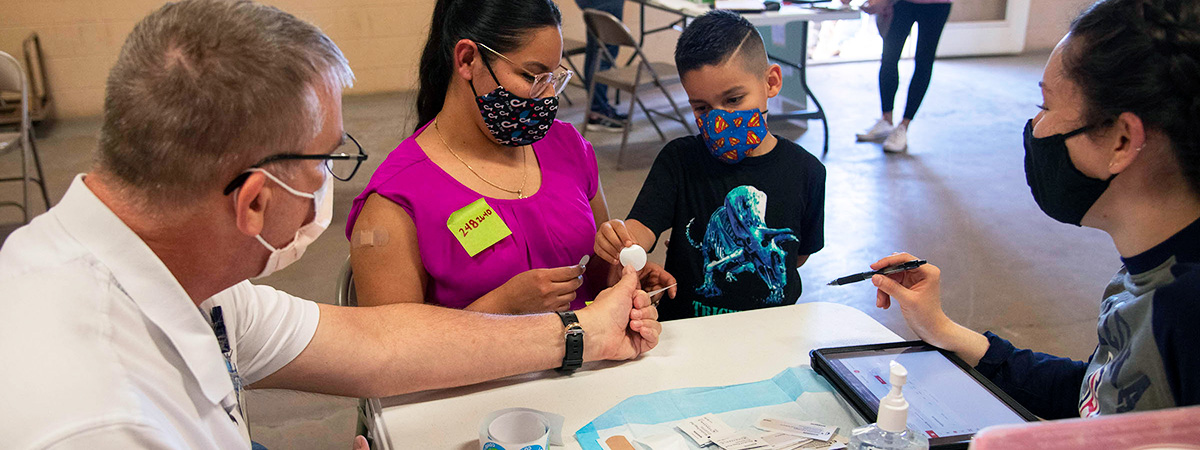Arizona Center for Rural Health Receives $8M COVID-19 Disparities Grant to Help Arizona’s High Risk, Underserved Communities

A grant from the Centers for Disease Control and Prevention and Arizona Department of Health Services will enable the Arizona Center for Rural Health at the Zuckerman College of Public Health to address COVID-19 disparities among racial and ethnic minority populations and rural communities in Arizona.
TUCSON, Ariz. — An $8.1 million grant to the Arizona Center for Rural Health will help address COVID-19 disparities by improving the delivery of COVID-19 vaccinations, testing and information, all services that build on existing networks and relationships with health providers in rural and underserved communities around Arizona.
The two-year grant from the Centers for Disease Control and Prevention (CDC) through the Arizona Department of Health Services (ADHS) is part of the “ADHS-CDC National Initiative to Address COVID-19 Disparities among Populations at High Risk and Underserved, Including Racial and Ethnic Minority Populations and Rural Communities.” The Center for Rural Health is housed in the University of Arizona Mel and Enid Zuckerman College of Public Health, part of UArizona Health Sciences.
“This CDC-ADHS funding will be so valuable to help rural communities fight COVID,” said Dan Derksen, MD, director of the Center for Rural Health and principal investigator on the initiative. “This collaboration builds on our vital partnership with ADHS and rural health providers around the state. The programs enabled by these funds will make a real difference, they will save lives and livelihoods.”
The Center for Rural Health will focus on two of the CDC-ADHS COVID-19 Disparities Initiative’s overarching strategies:
- Expand existing or develop new mitigation and prevention resources and services to reduce COVID-19 related disparities among underserved and high-risk populations.
- Mobilize partners to advance health equity and address the social determinants of health related to COVID-19 health disparities among higher risk and underserved populations.
The initiative will be guided by Dr. Derksen and co-leaders Mona Arora, PhD, MSPH, assistant professor at the Zuckerman College of Public Health, and Jen Peters, program manager for the Center’s State Office of Rural Health program. Dr. Arora, who previously served as co-chair for the UArizona COVID-19 Vaccine Task Force, brings considerable experience and expertise in emergency disease response and vaccine distribution.
“Often, rural communities in Arizona don’t have the health care resources they need, and the spread of COVID-19 has highlighted those disparities,” said Michael D. Dake, MD, senior vice president for UArizona Health Sciences. “Through this grant, the partnerships developed by the Center for Rural Health with local health care providers and community health workers across the state will be able to reach those communities more effectively.”
The Center for Rural Heath has a long track record of innovative collaboration with the ADHS through federal awards and interagency service agreements. Based on existing partnerships, the center will work closely with ADHS in conjunction with rural public health departments, the state’s rural and critical access hospitals, rural health clinics, rural community health centers and other rural health providers and stakeholders, including tribal operated and Indian Health Service providers and community health workers.
The center will deploy resources through the Area Health Education Center (AHEC) Program and its five AHEC Regional Centers to deliver targeted messaging to county and tribal health departments. In addition, the center will work closely with the Mobile Outreach Vaccine Education for Underserved Populations (MOVE UP) Program and the Advancing Health Equity, Addressing Disparities in Arizona (AHEAD) Program. MOVE UP, led by Cecilia Rosales MD, MS, sends mobile health units to underserved urban and rural communities to give vaccine shots and information, while AHEAD includes a champions campaign to enlist and train local vaccine advocates. The two programs serve as the initiative’s key outreach components and inspire its motto: “MOVE UP and AHEAD in Arizona.”
The Arizona Medical-assistance (AzMAT) Mentors Program, led by Ben Brady, DrPH, and Alyssa Padilla, MPH, will collaborate to improve access to testing, vaccination and mitigation. Public health issues exacerbated by the pandemic, such as suicides and opioid overdose deaths, will be addressed, and the Center for Rural Health will provide access to wrap-around social services in rural communities, including helping Arizonans determine their eligibility for, enroll in or renew their health insurance coverage.
CDC-ADHS COVID-19 Disparities funding will further support targeted messaging on COVID-19 prevention, vaccination, treatment and follow-up through a communications project guided by Nirav Merchant, PhD, using the Arizona Telemedicine Program platform. This will allow development and delivery of regular and interactive COVID-19 information tailored for specific audiences including the general public, health providers public health personnel and others. Recordings of the information will be available asynchronously to be accessed at any time.
Because rural health providers can be overwhelmed by rapidly evolving COVID-19 health information and recommendations, a program led by Sai Parthasarathy, MD, and Elizabeth Connick, MD, will create rapid response brief messaging. The messages will provide support from pulmonary, infectious disease, and allergy andimmunology specialists and will be designed to be delivered through videoconferencing and telehealth platforms.
The Center for Rural Health also will develop education and training resources and toolkits to increase knowledge and awareness among rural public health system partners. These resources will translate lessons learned from the pandemic to address social determinants of health and improve health outcomes into the future.
“Dan Derksen and the team at the Center for Rural Health have made such a big difference in the health of our rural and underserved communities, and this new funding shows their continued commitment to public health across Arizona,” said Iman Hakim, MD, MPH, dean of the Zuckerman College of Public Health, “With Mona Arora and Jen Peters as co-leaders on this initiative working to implement the COVID disparities programs, we will reach many Arizonans who need public health services and support. All of us in the college are very proud of what this team is accomplishing.”
For more information on the Center for Rural Health visit the website at https://crh.arizona.edu/.
# # #

